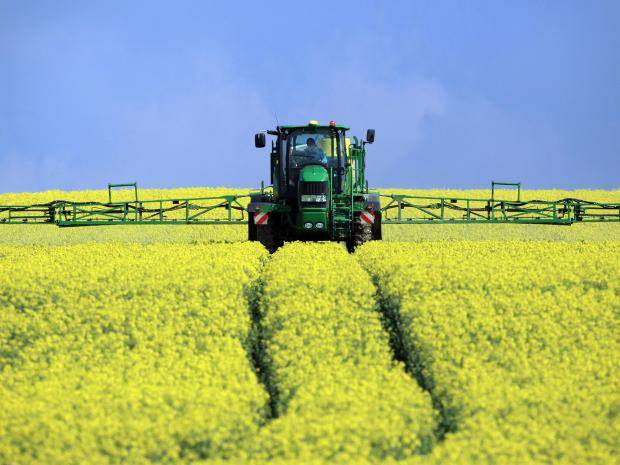
Glyphosate is the most commonly used weedkiller in the world and a vital tool for those in the food, farming and transport sectors.
After news broke that the weedkiller will be banned across the EU, many industry professionals began to panic about how their production processes would be affected — and most believe they would be significantly harmed.
Alongside Lycetts — a crop insurance supplier and financial services provider — we will discuss the use of glyphosate as a worldwide weedkiller, why the ban was implemented and what the prohibition will do to various UK industries.
Is glyphosate truly important to the UK?
As we mentioned, glyphosate is used all over the world — but what about its use in the UK? According to research from the Soil Association, the use of glyphosate in UK farming has increased by 400% over the past 20 years —The Guardian also reported that there has been nearly enough of the herbicide sprayed since its creation that it would cover every cultivable acre of Earth.
How and why the EU banned glyphosate
If glyphosate is such an effective weedkiller, why ban it? The move to prohibit the use of glyphosate came after a recent discovery of the harmful ingredient in cereals, crisps, bread, biscuits, and crackers. In reaction to the revelation, the European Parliament voted 355 to 204 in favour of outlawing glyphosate in October 2017.
This was not a quick decision — far from it. Scientists have warned those in government about the dangers of glyphosate for many years, however, it’s taken a two-year debate from within the European Parliament to come to the conclusion to outlaw it. Members of the EU and European Commission are now obligated to stop the use of glyphosate on farms, in public parks, and in households whenever other biological pest control systems are available. However, it’s worth remembering that this was a non-binding vote.
However, you can still purchase and use glyphosate today. That’s because the plan is to phase out the weedkiller over the course of five years, rather than take it off the market immediately. Perhaps, to allow sectors to prepare and make adjustments.
What are the main issues with glyphosate use?
Essentially, glyphosate is a safe ingredient if used correctly. However, it’s due to the risk of cross-contamination with food that the ban has been implemented. Fears have long been raised that the herbicide is a hormone disrupter that is linked to birth defects, the development of cancerous tumours and other developmental disorders. Some scientists have also argued that there is no safe lower level for human consumption.
How did glyphosate come about?
Glyphosate has been sold and purchased since 1974, when it was launched by Monsanto, and it is now used in sectors and environments such as: aquariums, streets, parks, schools,agriculture, and forestry. Originally called ‘Roundup’, it fast became an important product for farmers and those in construction to help kill weeds and boost productivity.
Will the ban on glyphosate adversely affect the food industry?
Health and safety is paramount, not just for those in the workplace, but also for consumers.However, there’s little doubt that banning glyphosate will significantly affect food production. A Polish orchard farmer, with experience of glyphosate, used Monsanto’s companion site, Growing Our Future, to state that:“Production costs of fruit farming will definitely go up as we look to use more time and energy consuming methods of weed control. When production costs go up, prices in shops also go up and people should be aware of this. For fruit farmers, there is no alternative to glyphosate because there are no other products that do what it does.”
The farmer’s sentiments were reciprocated by Monsanto’s vice president, Scott Partridge. He commented to The Guardian: “You would see increased costs for farming and decreased productivity, increased greenhouse gas emissions, loss of topsoil, and loss of moisture. Farmers through Europe would be very upset that a very effective and safe tool had been taken out of their hands.”
Clearly, those in the industry predict an adverse reaction to the ban of glyphosate.
Will the ban on glyphosate adversely affect the transport industry?
As a weedkiller, you’d probabaly assume that this ban would affect the growing and protection of UK food production. However, many also anticipate that the prohibition could influence various other sectors — notably, transport. Companies in charge of clearing railway lines also liberally use the substance to make their job more efficient. Weeds that are left unchecked can significantly restrict track visibility, track access for workers and possibly even render a line impassable in severe cases across Europe’s railways.
So, how do business utilise glyphosate and is there a way to replace the ingredient with something else? A method of using a “weed killer train” that sprays a glyphosate solution onto areas that have been identified by a high-tech camera as having weeds is employed by leading firm, Weedfree on Track. Operations manager at Weedfree on Track,Jonathan Cain, said: “We’ve carried out a number of trials to see how much more effective the train is than manual methods and have estimated that manually doing the same job, in the same time frame, can cost up to 40 times more.”
Already, those in the industry are scrambling to find a way around using glyphosate. However, no suitable alternative has been found yet. Jean-Pierre Deforet, a chemist at Belgian railway authority Infrabel, said in a Growing Our Future article: “The alternatives are to use mulch or to spray manually. But allowing people onto the tracks would cause another, bigger safety issue than spraying from the train.”
Evidently, the ban of glyphosate could risk productivity, efficiency and financial issues for multiple sectors in the UK if a substitute is not found within the five-year timeframe.
